
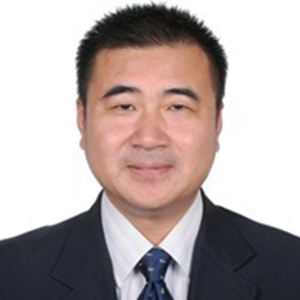
Prof. Fuchun Sun
Tsinghua University, China
(IEEE Fellow)
Biodata: Dr. Fuchun Sun is
professor of Department of Computer Science and Technology
and President of Academic Committee of the Department,
Tsinghua University, deputy director of State Key Lab. of
Intelligent Technology & Systems, Beijing, China. His
research interests include robotic perception and
intelligent control. He has won the Champion of Autonomous
Grasp Challenges in IROS2016. He is Fellow of IEEE.
Dr. Sun is the recipient of the excellent Doctoral
Dissertation Prize of China in 2000 by MOE of China and the
Choon-Gang Academic Award by Korea in 2003, and was
recognized as a Distinguished Young Scholar in 2006 by the
Natural Science Foundation of China. He served as
Editor-in-Chief of International Journal on Cognitive
Computaion and Systems, and Associated Editors of IEEE
Trans. on Neural Networks during 2006-2010, IEEE Trans. on
Fuzzy Systems since 2011, IEEE Trans. on Systems, Man and
Cybernetics: Systems since 2015 and IEEE Trans. on Cognitive
and Developement Systems since 2019.

Prof. Maria Pia Fanti
Polytechnic University of Bari, Italy
(IEEE Fellow)
Biodata: Maria Pia Fanti
(fellow of IEEE) received the Laurea degree in electronic
engineering from the University of Pisa, Pisa, Italy, in
1983. She was a visiting researcher at the Rensselaer
Polytechnic Institute of Troy, New York, in 1999. Since
1983, she has been with the Department of Electrical and
Information Engineering of the Polytechnic of Bari, Italy,
where she is currently a Full Professor of system and
control engineering and Chair of the Laboratory of
Automation and Control.
Her research interests include modeling and control of
complex systems, intelligent transportation systems, smart
logistics; Petri nets; consensus protocols; fault detection.
Prof. Fanti has published more than +300 papers and two
textbooks on her research topics. She was senior editor of
the IEEE Trans. on Automation Science and Engineering and
member at large of the Board of Governors of the IEEE
Systems, Man, and Cybernetics Society. Currently, she is
Associate Editor of the IEEE Trans. on Systems, Man, and
Cybernetics: Systems, member of the AdCom of the IEEE
Robotics and Automaton Society, and chair of the Technical
Committee on Automation in Logistics of the IEEE Robotics
and Automation Society. Prof. Fanti was General Chair of the
2011 IEEE Conference on Automation Science and Engineering,
the 2017 IEEE International Conference on Service Operations
and Logistics, and Informatics and the 2019 Systems, Man,
and Cybernetics Conference.

Prof. Chun-Yi Su
Concordia University, Canada
(Fellow of JSPS)
Biodata: Prof. Chun-Yi Su received his Ph.D. degrees in control engineering from South China University of Technology in 1990. After a seven-year stint at the University of Victoria, he joined Concordia University in 1998, where he is currently a Professor of Mechanical, Industrial & Aerospace Engineering and holds the Concordia University Research Chair in Control. He has also held several short-time visiting positions including a Chang Jiang Chair Professorship by China’s Ministry of Education and JSPS Invitation Fellowship from Japan.
Dr. Su’s research covers control theory and its applications to various mechanical systems, with a recent focus on control of systems involvinghysteresis nonlinearities. He has made fundamental contribution to modeling and control of nonlinear systems involving hysteresis nonlinearities. He developed some fundamental properties for the early development of constrained robotic control. He is the author or co-author of over 400 publications, which have appeared in journals, as book chapters and in conference proceedings.
Dr. Su has served as an Associate Editor of IEEE Transactions on Automatic Control, the IEEE Transactions on Control Systems Technology. He has been on the Editorial Board of several journals, including IFAC’s Mechatronics. He is a Distinguished Lecturer of IEEE RA Society and he has served for many conferences as an organizing committee member.
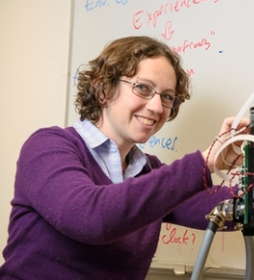
Prof. Ilana Nisky
Ben-Gurion University of the Negev, Israel
(IEEE Senior Member)
Biodata: Ilana Nisky received the B.Sc (summa cum laude), M.Sc. (summa cum laude), and Ph.D. in Biomedical Engineering from the Department of Biomedical Engineering, Ben-Gurion University of the Negev, Israel, in 2006, 2009, and 2011, respectively. She is currently an associate professor in the Department of Biomedical Engineering, Ben-Gurion University of the Negev, where she is the head of the Biomedical Robotics Lab. She is also the head of the Israel-Italy Virtual Lab on Artificial Somatosensation for Humans and Humanoids, and the principal investigator on rehabilitation with haptic interfaces at the Neuro Negev Lab - Translational Neurorehabilitation Lab. She was previously a postdoctoral research fellow in the Department of Mechanical Engineering, Stanford University. She is the recepient of the 2019 IEEE RAS Early Academic Career Award, the prestigious Alon Fellowship for young faculty from the Israeli Council for High Education, and the Marie Curie International Outgoing Fellowship from the European Commission. Her research interests include human motor control, haptics, robotics, human and machine learning, teleoperation, and robot-assisted surgery, and her lab is supported by competitive grants from the Israeli Science Foundation, the Israel-US Binational Science Foundation, and the Ministry of Science and Technology. Nisky has authored more than 60 scientific publications in peer-reviewed journals and conference proceedings, and numerous abstracts in international conferences. She is an Associate Editor at the IEEE Transactions on Haptics, the IEEE Robotics and Automation Letters, and IEEE Transactions on Neural Systems and Rehabilitation Engineering journals, a member of the BGU ABC Robotics Initiatuve, and the Zlotowski Center for Neuroscience. She served as an executive committee member of the EuroHaptics Society 2014-2018, and is a board member of the Israeli Society for Medical and Biological Engineering. She is a Senior Member of IEEE, a member of the Society for the Neural Control of Movement, the Society for Neuroscience, Technical Committee on Haptics, and American Physiology Society.
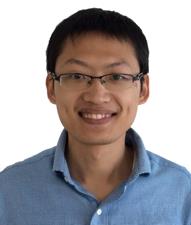
Prof. Zhi Li
Northeastern University, China
Biodata: Dr. Zhi Li is Professor of the State Key Laboratory of Synthetical Automation for Process Industries at Northeastern University, China. He finished his doctorate in Mechanical Engineering at Concordia University, Canada in 2015. He had two postdoctoral research experience at Eindhoven University of Technology, Netherlands and York University, Canada. After that, he was invited as an Alexander von Humboldt Research Fellow to conduct research at University of Magdeburg, Germany. His research focuses on modeling and control of smart materials-actuated mirco/nano positioning systems, advanced mechatronics systems, and motion control. On these topics, he has published 36 journal papers, 15 conference papers, 2 book chapters and 2 patents, and one of his conference papers received T. J. Tarn’s Best Paper Award on Control Applications in the 11th World Congress on Intelligent Control and Automation (WCICA). He is currently serving as Associate Editor for IEEE Transactions on Industrial Electronics.
coming more...
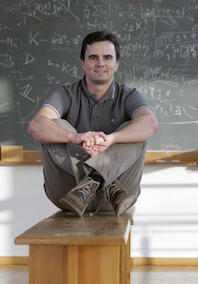
Prof. Jan Peters
Technische Universitaet Darmstadt, Germany
(Fellow of IEEE)
Biodata: Jan Peters is a
full professor (W3) for Intelligent Autonomous Systems at
the
Computer Science Department
of the Technische Universitaet Darmstadt
and at the same time an adjunct senior research scientist at
the
Max-Planck Institute for Intelligent Systems,
where he heads the interdepartmental Robot Learning Group
between the departments of
Empirical Inference
and
Autonomous Motion. Jan Peters has received a few awards, most notably, he has received the Dick Volz
Best US PhD Thesis Runner Up Award, the Robotics: Science &
Systems - Early Career Spotlight, the
IEEE Robotics & Automation Society's Early Career Award,
and the
International Neural Networks Society's Young Investigator Award.
Jan Peters graduated from the University of Hagen in 2000 with a Diplom-Informatiker (German M.Sc. in Computer Science) with a focus on artificial intelligence and from Munich University of Technology (TU Muenchen) in 2001 with a Diplom-Ingenieur Elektrotechnik (German M.Eng. in Electrical Engineering), majoring in automation & control. In 2000-2001, he spent two semesters as visiting student at National University of Singapore. Subsequently, he moved to University of Southern California (USC) where he completed another M.Sc. in Computer Science with a focus on Machine Learning and a M.Sc. in Aerospace and Mechanical Engineering with a major in nonlinear dynamics. During his studies, Jan Peters has been a visiting research student at the Department of Robotics at the German Aerospace Research Center in Germany, at Siemens Advanced Engineering in Singapore and at the Department of Humanoid Robotics and Computational Neuroscience at the Advanced Telecommunication Research (ATR) Center in Japan. Get more information here.

Prof. Shane Xie
University of Leeds, UK
(Fellow of IPENZ)
Biodata: Professor Shane Xie joined the University of Leeds as Chair in Robotics and Autonomous Systems (2017- ). He received his BE in Control Engineering, M.Sc., and Ph.D. in Mechatronics Engineering from Huazhong University of Science and Technology (HUST), China, in 1992, 1995, and 1998, respectively. He was a Research Associate (1998-1999) and a FoRST (Foundation for Research, Science and Technology) Postdoctoral Fellow (1999-2002) at the University of Canterbury and was awarded a second PhD in Mechanical Engineering. He worked in the University of Auckland, New Zealand as Lecturer (2003-2005), Senior Lecturer (2006-2009), Associate Professor (2010-2011) and Chair Professor (2011-2017), in Mechatronics Engineering.
Prof Xie is an elected fellow of IPENZ (Institution of Professional Engineers New Zealand), a Strategic Scientist of Wuhan University of Technology and a Chutian Scholar of Huazhong University of Science and Technology in China. He was the David Bensted Fellow, Simon Fraser University, Canada. He played a leadership role in the establishment of the Mechatronics Engineering programme and was the Director of a Master of Engineering Programme on Medical devices and Technologies (2010-2017) at the University of Auckland. This programme was funded by TEC ($1.8M) to support innovation in medical technology, and was collaborated between the Faculties of Engineering and Medical and Health Sciences, as well as the Medical Technology Association of New Zealand. The programme provided 15~30 Masters each year with multidisciplinary knowledge and skills required to underpin successful innovation in the medical devices industry, filling the large demand for these skills in NZ medical device industry.
Prof Xie led many government funded research projects as Principal Investigator and so far has completed over 50 funded research projects totalling over $15M of research contracts from government granting agencies and industries in New Zealand and overseas. The projects he led have been closely engaged with local industries and overseas. For example, the project “Enabling Technology for Rapid Development of High Value-added Customised Products” , funded by FoRST, contributed to three leading NZ companies including Rakon Ltd, Compac Sorting Equipment Ltd and Gallagher Ltd. Another project “Novel Enabling Technology for Wearable Assistive Devices” funded by FoRST was selected as the key international collaborative project between New Zealand and China. He also led 5 overseas projects totalling over $5M, funded by the National Natural Science Foundation of China and the Federal Ministry of Education and Research of Germany. He has also actively contributed to other large government funded projects over $30M in both New Zealand and overseas. One project he involved as an Associated Investigator was supported by The Medical Technologies Centre of Research Excellence (CoRE) totalling $23M from 2015 to 2020.
Prof Xie has published more than 400 refereed papers and 7 books in areas largely related to advanced robotics and mechatronics technologies for medical and rehabilitation. He has supervised over 100 postgraduate students in the field of Mechatronics and Robotics Engineering including 23 post-doctoral fellows/visiting fellows, 42 PhDs, 38 MEng students, and over 140 BE project students. Prof Xie has been recognised internationally as world leader in the field of Mechatronics and Robotics. He was invited to be the Editor or Technical Editor of five reputable international journals. He was the Technical Editor of IEEE/ASME Transaction on Mechatronics (2013-2017), the Editor-in-Chief for the International Journal of Biomechatronics and Biomedical Robotics; the Associate Editor of International Journal of Mechatronics and Manufacturing Systems, International Journal of Advanced Mechatronic Systems, and International Journal of Mechatronics and Intelligent Manufacturing. He was invited to be a national or international panel member by funding organisations from the Foundation for Research, Science and Technology of NZ, the NSERC Discovery grant/Partnership grant of Canada, the National Natural Science Foundation of China, and the National Science Foundation of Korea. For more information, please browse here.

Prof. Chun-Yi Su
Concordia University, Canada
(Fellow of JSPS)
Biodata: Prof. Chun-Yi Su received his Ph.D. degrees in control engineering from South China University of Technology in 1990. After a seven-year stint at the University of Victoria, he joined Concordia University in 1998, where he is currently a Professor of Mechanical, Industrial & Aerospace Engineering and holds the Concordia University Research Chair in Control. He has also held several short-time visiting positions including a Chang Jiang Chair Professorship by China’s Ministry of Education and JSPS Invitation Fellowship from Japan.
Dr. Su’s research covers control theory and its applications to various mechanical systems, with a recent focus on control of systems involvinghysteresis nonlinearities. He has made fundamental contribution to modeling and control of nonlinear systems involving hysteresis nonlinearities. He developed some fundamental properties for the early development of constrained robotic control. He is the author or co-author of over 400 publications, which have appeared in journals, as book chapters and in conference proceedings.
Dr. Su has served as an Associate Editor of IEEE Transactions on Automatic Control, the IEEE Transactions on Control Systems Technology. He has been on the Editorial Board of several journals, including IFAC’s Mechatronics. He is a Distinguished Lecturer of IEEE RA Society and he has served for many conferences as an organizing committee member.
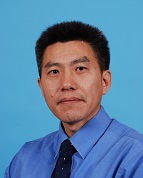
Prof. Zhengtao Ding
The University of Manchester, UK
Biodata: Zhengtao Ding received B.Eng. degree from Tsinghua University, Beijing, China, and M.Sc. degree in systems and control, and the Ph.D. degree in control systems from the University of Manchester Institute of Science and Technology, Manchester, U.K. After working as a Lecturer with Ngee Ann Polytechnic, Singapore, for ten years, he joined the University of Manchester in 2003, where he is currently Professor of Control Systems with the Dept of Electrical and Electronic Engineering. He serves a member of the school/department leadership team, and Deputy Head of Control, Communication and Signal Processing Division in the university. He is the author of the book: Nonlinear and Adaptive Control Systems (IET, 2013) and has published over 260 research articles. His research interests include nonlinear and adaptive control theory and their applications, more recently network-based control, distributed optimization and distributed machine learning, with applications to power systems and robotics. Prof. Ding has served as an Associate Editor for the IEEE Transactions on Automatic Control, IEEE Control Systems Letters, and several other journals. He is a member of IEEE Technical Committee on Nonlinear Systems and Control, IEEE Technical Committee on Intelligent Control, and IFAC Technical Committee on Adaptive and Learning Systems.

Prof. Richard Mitchell
University of Reading, UK
Title: “A Cybernetic Approach to Introducing Robotics“
Abstract: Begin Robotics is a successful open online course on FutureLearn, which uses cybernetics to introduce robotics, control, haptics, artificial intelligence and artificial life (including Lovelock's Daisyworld). Whilst aimed at Key Stage 3 pupils as a recruitment tool, it also features in the first year of the undergraduate degree in Computer Science. The course features various robots, including a specially designed robot called ERIC which appears in some videos, and interactive web pages which are used to illustrate key concepts and in exercises where users determine the velocities of ERIC so that it can perform suitable actions. This talk will give an overview of the course, the cybernetic approach employed, demonstrate some of the web pages which are used, and feature the "robots behaving badly" out take video.
Biodata: Richard Mitchell is Professor of Cybernetics and a University Teaching Fellow at the University of Reading, which he first attended as an undergraduate reading Cybernetics & Control Engineering, prior to his PhD, entitled 'Multimicroprocessor Control of Processes with Pure Time Delay', before becoming a lecturer. He has held many offices at Reading, including Head of Department of Cybernetics, Director of Teaching and Learning and then Senior Tutor in the School of Systems Engineering, and is currently Director of Technology Enhanced Learning in the School of Mathematical, Physical and Computational Sciences at Reading. He is the lead educator for the successful open online course on FutureLearn entitled “Begin Robotics". He programmed the "seven dwarf" robots in Cybernetics which were forerunners of the ERIC robot which features in "Begin Robotics". His interests include artificial intelligence, control, robotics, Gaia and online learning.